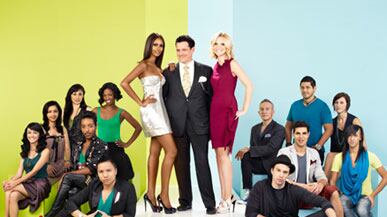Now I know how NBA star Spencer Haywood, Iman’s second husband, felt. She walked out on me, too. But at least he got to sleep with her.
I had met She of the Elongated Neck once before for lunch on an eerily warm winter’s day in 2009 close to her downtown loft when I was interviewing her for Parade magazine to talk about the launch of her Global Chic line of clothing on the Home Shopping Network. That day she could not have been lovelier, and we had a wide-ranging conversation. I adored her but in retrospect her own warmth now strikes me as eerie as well. We talked about her family—her father was a diplomat and she spent a portion of her childhood in Saudi Arabia where he was posted—and their subsequent escape from Somalia during the country’s civil war with only the clothes on their backs. Anything was open for discussion. Her Muslim heritage. Her marriages. (She has been married to David Bowie now for 18 years.) She softened when she talked about her children. Grew serious when discussing her charities. She was more than chatty, confessing her insecurities and her love/hate relationship with the fashion world.
Her newest gig is the host of Bravo’s second attempt at a fashion reality show after Project Runway moved to the Lifetime Network. Bravo has tweaked the show to make it slightly different than Runway, but trying to reinvent a fashion reality show after it had successfully created the template was proving difficult. So if you watched the show’s premiere the other night you know they’ve cast the contestants this season with the requisite archetypes: the haughty bitch played by a gay guy, an innocent or two from the Midwest or the South, a straight guy who could pass for gay, an L.A. hipster, and a few young women who take it all—fashion, their talent, life itself—too seriously. It is titled—ta-da!— The Fashion Show: Ultimate Collection.
Iman has taken over for Kelly Rowland, the first season’s host. Isaac Mizrahi, a hold-over from the first season, has somehow been convinced to tone it down a bit. He will never be a prissy goy, thank God, but he’s still Tim Gunnish enough. Laura Brown from Harper’s Bazaar is also back as the blonde version of Marie Claire’s Nina Garcia. This season someone up there at Bravo must have thought: Fuck it, let’s just go out again and hire a supermodel of a certain age with a foreign accent who’s married to an exotic rock star to host the damn thing and call it a day.
Gallery: Iman

Hence, it came to pass, that Iman is now having to wake up every day for the rest of her life and realize she is a replacement for Kelly Rowland. Hell, I’d be in a pissy mood, too. On Monday she was scheduled for a full day of press to promote the series, drudgery under the best of circumstances. She had just appeared on Today and it had not gone according to plan. Matt and Meredith had pawned her off on Natalie Morales and the segment had run short. I waited for her in a suite at The Regency Hotel on Park Avenue as she decided maybe a change of clothes would lift her spirits. At first, it seemed to work. She swept into the room wearing a pencil skirt and little cashmere cardigan, the mink on its collar a shade lighter than the Veronica Lake-like wig that very much wanted to be noticed there on her head. Though all wrong for her at first glance, the wig worked wonders under the television lights already set up for hours of interviews that lay ahead of her. The wig’s awful artifice, catching those lights in its slightly shiny strands, framed and bathed her face in a glow that highlighted her genuine beauty. “Hello, dahling!” she intoned and kissed the ever glowless air around yet another journalist’s cheeks.
I asked about her family and, because our time was limited and I wanted to talk mostly about her show, I asked, “Would you mind if I used a couple of the quotes I have left over from the Parade interview...”
At that, there was what could only be described as a diva detonation. She stormed off in a royal huff and terminated the interview. I was literally shaken. In 25 years no one has ever walked out on me, and I can ask some pretty impertinent questions. What had set her off? She had not even let me finish my sentence in which I had planned to say, “...but if you don’t want me to I won’t.”
I sought to use those two unused quotes—and I would have told her which two they were if she had remained seated for more than 30 seconds—because of the qualities they showed in her. The first was a story her mother had told her about her infancy in Somalia. It was sweet and funny and self-deprecating, nothing like the infantile behavior she had just displayed. The other was an anecdote about her very first photo shoot and pointed out how a woman of color, even at her most naive, must steel herself against a kind of offhanded racism that may from time to time ruin her day but will not be allowed to ruin her life.
I have no idea what it is like for such a woman—so beautiful, so smart, so strong—to have to endure the slights and insults of every day life as she makes her way through the maze of bigotry that most of us are blind to. They add up. And perhaps they result sometimes in behavior that could be described as diva-like or just plain bad. “Tethered” has ugly connotations for such women, so it is a testament to their sisterhood that they can reclaim the word; they are tethered one to another by an invisible cord that is wound together with equal components of loyalty and respect.
Indeed, the issue she had with the Parade article, I have now learned, was a quote she thought had been taken out of context. It had been, I admit, taken from the body of the story by the editors and made the lede because they rightly thought it would have more of an impact. But it was completely accurate. It was about America’s first lady. I had asked Iman how she felt about her as a fashion icon. It read:
“Mrs. Obama is not a great beauty,” Iman says, startling me a bit. “But she is so interesting looking—so bright. That will always take you farther. When you’re a great beauty, it’s always downhill for you. If you’re someone like Mrs. Obama, you just get better with age.”
I read that as praise of our first lady, but many of the snarkier websites had focused on her saying that Michelle Obama was not a great beauty, and they wrongly took her to task.
It was another of her quotes from that article, however, that haunted me when Iman was honored with the Fashion Icon award from the CFDA at is annual ceremony this past June. That quote had been as heartbreaking as it had been controversial—so controversial, in fact, that Parade chose finally to edit it out of the print magazine and only run it on its website. I had asked her if her sense of otherness as a black supermodel had made her feel even more special or had it made her feel ostracized. She replied:
She stormed off in a royal huff and terminated the interview. I was literally shaken.
“I did feel a bit ostracized. You suddenly represent a whole race and that race goes, ‘Well that person does not represent our ideals of beauty.’ For lack of a better term, it becomes what it was like during slavery. One had the ‘field n***s’ and the ‘house n***s.’ There was this notion that I was chosen by white fashion editors to be better than the rest—which I am not. I did not like being thought of as the ‘house n***r,’ whether it was spoken or whether it was understood.”
Had she that night at the CFDA ceremony felt like Hattie McDaniel winning an Oscar for playing one in Gone With the Wind? Or had she, this most resilient of refugees, standing there awash in all that applause—all that love and respect—finally felt at home? I guess I’ll never know because that was one of the questions I wanted to ask her.
The other night, on the premiere episode of The Fashion Show: Ultimate Collection, the gay-guy-as-haughty-bitch was one of the two contestants who was in danger of being cut from the show. It is Iman’s job now to decide who is ostracized. That gay guy was allowed to stay around another week, but on Monday morning this gay guy was summarily dismissed as Iman—in the role of the haughty bitch, for I cannot believe that is who she really is—strode from the room and refused even to grant me a second audience to apologize for upsetting her.
How does one say auf Wiedersehen in Somali?
Kevin Sessums is the author of the New York Times bestseller Mississippi Sissy, a memoir of his childhood. He was executive editor of Andy Warhol's Interview magazine and a contributing editor of Vanity Fair and Allure. He is a contributing editor of Parade. His new memoir, I Left It on Mountain , will be published by St. Martins Press.






